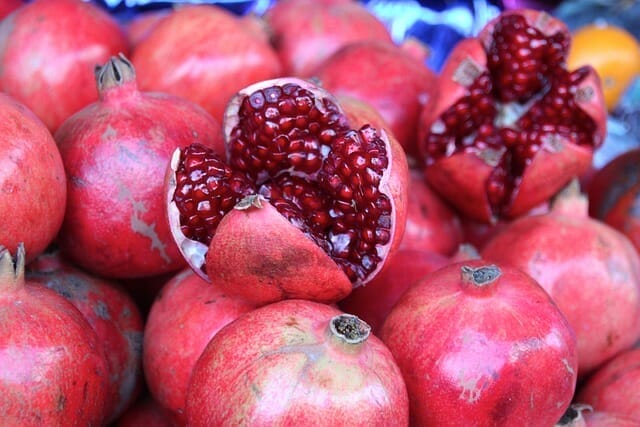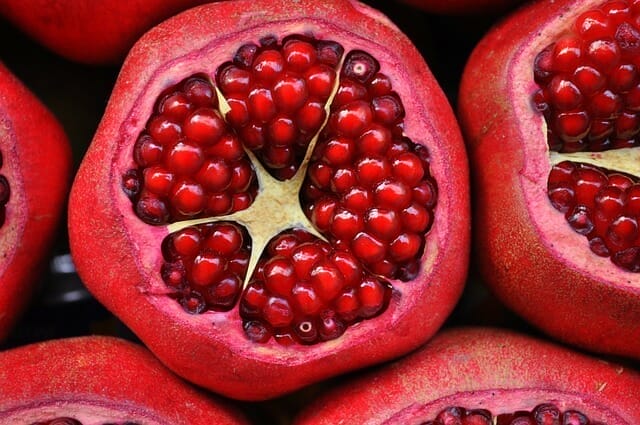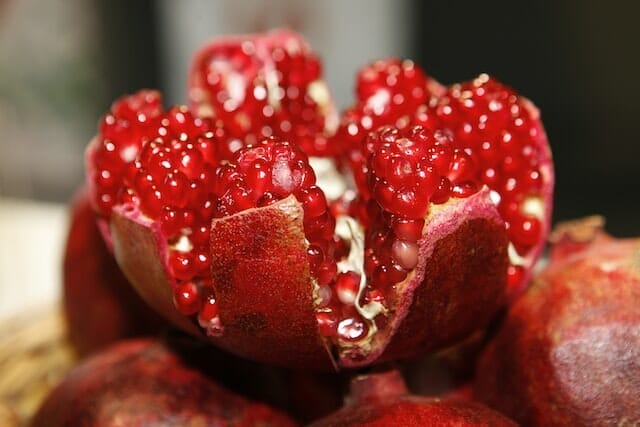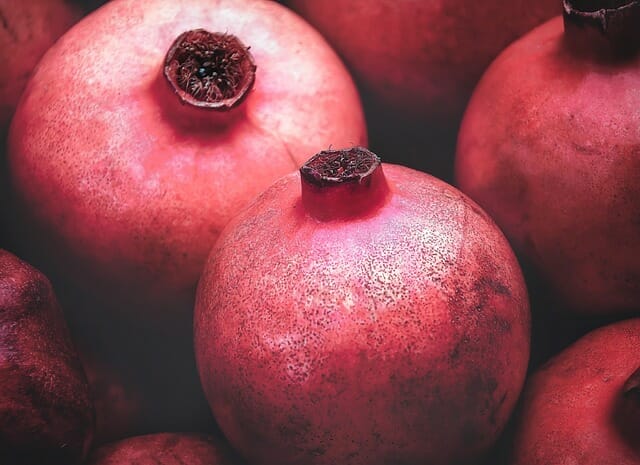Pomegranate is a very tasty and remarkably juicy fruit, originating from Asia, and at the same time a treasure trove of health-promoting ingredients. Undoubtedly, it is one of the healthiest fruits in the world. Its qualities were appreciated already in antiquity. In ancient cultures it was considered a symbol of fertility, energy, strength, health and flourishing. Regular consumption of pomegranate is a way to improve the body on many levels. It is also a method to strengthen the defense barrier against dangerous diseases of civilization, improve the condition of the cardiovascular system and get rid of urinary tract ailments. Find out what are the properties of pomegranate and why you should consume it.
Table of contents
- 1 Pomegranate – a tropical fruit known since ancient times, which is worth learning more about
- 2 Pomegranate – nutritional values
- 3 Pomegranate – medicinal properties. Why should you introduce pomegranate fruit into your diet?
- 4 Pomegranate – effects on the prostate
- 5 Pomegranate for the urinary tract
- 6 Pomegranate for diabetes
- 7 Antioxidant and anti-cancer properties of pomegranate
- 8 Pomegranate – anti-cholesterol and cardioprotective properties
- 9 Pomegranate seed oil, pomegranate juice – how to consume pomegranate for medicinal purposes?
- 10 How to eat pomegranate fruit?
- 11 How do you peel the pomegranate fruit?
- 12 How to use the pomegranate peel?
Pomegranate – a tropical fruit known since ancient times, which is worth learning more about

Pomegranateproper (Punica granatum L.) is a member of the bloodroot family. It grows on small trees that are 2 to 5 meters high. It is a fruit with a characteristic flesh, which is formed by a dense network of shiny seeds. Each of them is clothed with a juice-filled pinkish shell. This flesh is extremely tasty – strongly sweet, and at the same time refreshing, slightly sour. In appearance, the pomegranate somewhat resembles an apple. It is similar in size and color (reddish), but its skin is much thicker.
Although the pomegranate is distinguished by its very attractive taste, it is mostly consumed by us sporadically. And this is a pity. It is a fruit not only of high culinary value, but also with a very long list of health benefits, among which are strong anti-inflammatory, antioxidant and cardioprotective effects. Also called the fruit of life or fruit of paradise, the pomegranate originated in Asia. Today its largest plantations are located in Iran, India, Spain, Israel and USA.
The pomegranate for medicinal and food purposes was consumed by humans centuries ago. The history of this fruit dates back to ancient times. It was appreciated in ancient China, Egypt, Mesopotamia and Greece, among others. A variety of ailments were treated with it, including parasitic and bacterial diseases, diarrhea, hemorrhages, ulcers, throat infections, heart problems, urinary tract ailments, infertility. It was also used to prepare elixirs of love, youth and vitality.
Pomegranate – nutritional values
Pomegranate, like any fruit, contains a lot of carbohydrates, but is not a threat to our figure. It also does not tend to rapidly raise blood sugar levels. It has a low glycemic index (35) and contains a lot of valuable dietary fiber.
100 grams of pomegranate fruit provides: 83 kcal, 18.7 g of carbohydrates, 4 g of fiber, 1.7 g of protein.
Pomegranate is an extraordinary fruit rich in vitamins and minerals. In its composition we can find: folic acid and other B vitamins, vitamin C, vitamin E, vitamin A, potassium, zinc, magnesium, calcium, selenium, copper, manganese, phosphorus.
Pomegranate also contains many bioactive compounds with health-promoting properties, such as polyphenols, carotenoids, tannins, anthocyanins, organic acids. It is also worth noting the phytoestrogens contained in pomegranate fruit, which strongly support the body’s hormonal balance.
Pomegranate – medicinal properties. Why should you introduce pomegranate fruit into your diet?
Pomegranate has anti-inflammatory, antibacterial, antifungal and antiviral properties. By stimulating the immune system to work and inhibiting the growth of microorganisms and parasites, as well as extinguishing inflammation, it helps fight various types of infections, whether internal or skin infections.
Pomegranate will be perfect for colds, flu-like infections, fevers and upper respiratory tract infections. What’s more, pomegranate shows beneficial effects on the digestive system. It improves digestive processes, supports intestinal function, counteracts constipation, flatulence, bowel problems. It is also helpful in inhibiting diarrhea.
Pomegranate fruit is also a valuable support for the endocrine system. It helps normalize the concentration of hormones, including testosterone and estrogen. Thanks to the phytoestrogens it contains, it alleviates symptoms of hormonal fluctuations (including symptoms of menopause and andropause). Pomegranate fruit is also not lacking in strengthening properties. Thanks to its rich pool of antioxidants, vitamins and minerals, it supports the body in weakened and convalescent states, restores vitality and improves regeneration.
Pomegranate – effects on the prostate

Systematic use of pomegranate is recommended for men struggling with prostate problems. This fruit reduces inflammation in the prostate gland, bringing relief from pain, while also alleviating problems with urination and excessive pressure on the bladder.
Thanks to numerous polyphenolic compounds and other components with antioxidant properties, pomegranate fruit has a protective effect on prostate cells and significantly reduces the rate of progression of prostate growth. In one study, compounds in pomegranate were shown to reduce the development of prostate cancer and slow the rise in PSA levels.
Highly active pomegranate extract, along with a composition of other ingredients that benefit prostate health, can be found in Prostan Plus.
Pomegranate fruit also helps reduce blood cholesterol levels, and it is not uncommon for high cholesterol to exacerbate prostate problems. Speaking of typically male ailments, it is also worth mentioning that pomegranate fruit has a positive effect on potency and erection.
Pomegranate for the urinary tract
Pomegranate significantly improves the functioning of the urinary tract. Thanks to its diuretic properties, it counteracts urine retention in the bladder, improves the flow of urine, eliminates the problem of initiating urination. It also reduces the frequency of visits to the toilet and counteracts incontinence. By acting as an anti-inflammatory, it reduces urinary tract infections.
Pomegranate for diabetes
Due to the high concentration of phenolic compounds and dietary fiber in pomegranate, this fruit leads to normalization of blood glucose. For this reason, it is often recommended for people with diabetes, as well as those who are pre-diabetic and have insulin resistance.
Antioxidant and anti-cancer properties of pomegranate
When we would search for foods richest in antioxidants (antioxidants), pomegranate fruit would be on one of the first places. It contains more of them than green tea and red wine. Thanks to antioxidants, it is a powerful weapon against free radicals, and thus helps keep cells in better condition and prevents their damage and mutation.
Through antioxidant activity, pomegranate fruit reduces the likelihood of the cancer process. Moreover, the fruit is a valuable weapon in the fight against cancer. It inhibits the growth of cancer cells and helps in their destruction.
Pomegranate – anti-cholesterol and cardioprotective properties
As studies have shown, consuming 1 glass of pomegranate juice per day helps lower bad cholesterol LDL. The fruit improves blood flow, prevents the formation of blood clots and helps normalize blood pressure. With its numerous antioxidants, pomegranate fruit protects the heart and lowers the risk of atherosclerosis and other cardiovascular diseases.
Pomegranate seed oil, pomegranate juice – how to consume pomegranate for medicinal purposes?
Consuming pomegranate in any form brings health benefits. Both fresh pomegranate fruit, pomegranate seed oil, pomegranate juice, as well as pomegranate-based liquid extracts and pomegranate extracts in capsules will work. The best health-promoting and healing effects will be obtained when pomegranate is used regularly and in sufficiently large quantities (e.g., a glass of pomegranate juice a day or 500 mg of extract a day).
How to eat pomegranate fruit?

Pomegranate is excellent for eating raw, but also carries many other culinary uses. It goes well with typical sweet dishes, and is also an interesting sweet and fruity break in salty dishes.
Pomegranate seeds can be used as a garnish for dishes, or we can add them to salads, stuffing for pancakes, omelets, croutons, casseroles, or to roasted or grilled meat. From the fresh pomegranate fruit we can squeeze the juice or add to a smoothie from a blender. Pomegranate seeds are also an ideal addition to fruit salads, jams, baked goods, oatmeal and all kinds of desserts.
How do you peel the pomegranate fruit?
We cut off the tip of the pomegranate. Then we cut the shell so that the fruit is divided into quarters. We put it in a dish with lukewarm water. After 15 minutes, when the shell has soaked, we bend it off and separate the seeds from it. When they sink to the bottom, we remove them from the water and dry them.
How to use the pomegranate peel?
We can dry the pomegranate peel and then use it to make healing infusions for the skin. They will work well for various infections, irritations, seborrhea, skin eruptions. Infusions can also be an additional treatment for skin in need of revitalization.
Sources:
- https://www.healthline.com/nutrition/12-proven-benefits-of-pomegranate
- https://www.webmd.com/diet/health-benefits-pomegranates
- https://www.webmd.com/prostate-cancer/alternative-treatments-for-prostate-cancer2
- https://pubmed.ncbi.nlm.nih.gov/31298147/
- https://www.ncbi.nlm.nih.gov/pmc/articles/PMC7587354/

